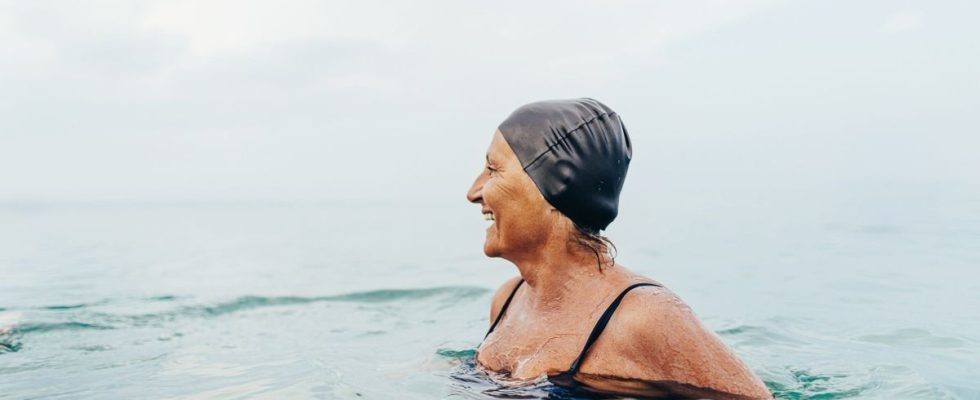Published on
Updated
Reading 3 min.
Blood circulation, immune system, stress: swimming in cold water would be beneficial for many aspects of health, but it is a unique advantage that British researchers are now highlighting. This outdoor activity would significantly improve the physical and mental symptoms associated with menopause. Explanations.
We already knew that the ice baths were beneficial for reducing stress levels, strengthening the immune system, and even boosting blood circulation, but they could also prove effective in alleviating some of the symptoms of menopause. These are the conclusions of a study carried out by researchers from University College London (UCL) who evaluated the effects of this physical activity on 1,114 women, including 785 postmenopausal women, who were already engaging in it before this work. “The cold water is phenomenal. She saved my life. In the water, I can do anything. All symptoms disappear and I feel my best“, rejoices one of the participants aged 57, quoted in a UCL press release.
Lower anxiety levels
Published in the journal Post Reproductive Health, the results of this work suggest that swimming in cold water has indeed helped to alleviate some of the symptoms linked to menopause. The women concerned notably mentioned an improvement in anxiety levels (47%), mood swings (34%), depression (31%), and hot flashes (30%) after swimming in cold water. The researchers also observed an improvement in mental symptoms related to menstruation in the affected women.
“Cold water has previously been found to improve mood and reduce stress in people who swim outdoors, and ice baths have long been used to promote muscle repair and recovery in athletes. Our study supports these claims, while anecdotal evidence also highlights how women can use this activity to relieve physical symptoms, such as hot flashes, aches and pains.“, underlines Professor Joyce Harper, main author of the study.
In their conclusions, UCL researchers also explain that a large majority of women, around 63%, engaged in this outdoor activity solely to relieve these symptoms. Based on certain comments mentioned in the study, it seems that swimming in cold water is considered a real breath of fresh air by those mainly concerned. Which report “immediate relief from stress and anxiety“, or consider this practice as a “curative” activity.
The combined effects of cold and nature
“The majority of women swim to relieve symptoms such as anxiety, mood swings and hot flashes. They find that their symptoms are relieved by the physical and mental effects of the cold water, which become stronger as the water temperature drops. The frequency of swimming sessions, their duration and their attire also played an important role. Those who swam longer experienced more pronounced effects. The benefit of cold water swimming is that it allows people to exercise in nature, and often with friends, which can create a great community“, continues Professor Joyce Harper.
This is not the first time that the benefits of cold water, and more generally of cold, have been highlighted. At the beginning of the 2000’s, a Finnish study already extolled the benefits of ice baths on overall well-being. Winter swimming, or ice swimming, is very widespread in the countries of northern Europe. In Finland, we find this practice in particular under the name of avanto, an ice ritual which would stimulate blood circulation, strengthen the immune system, help recovery, and promote the firmness and elasticity of the skin. skin. In the same vein, the Wim Hof methodinvented by the Dutchman of the same name, would guarantee “a state of absolute well-being and fullness“. This practice, which has not been validated by science, consists of combining meditation and an ice bath.
Be careful, however, swimming in cold water is not without risks, as the main author of this study points out. “Caution is required when swimming in cold water, as participants are exposed to the risk of hypothermia, thermal shock, heart rhythm disturbances, and even drowning. Depending on where they bathe, water quality standards can also vary“, she explains. Parameters to take into account before taking the plunge.
